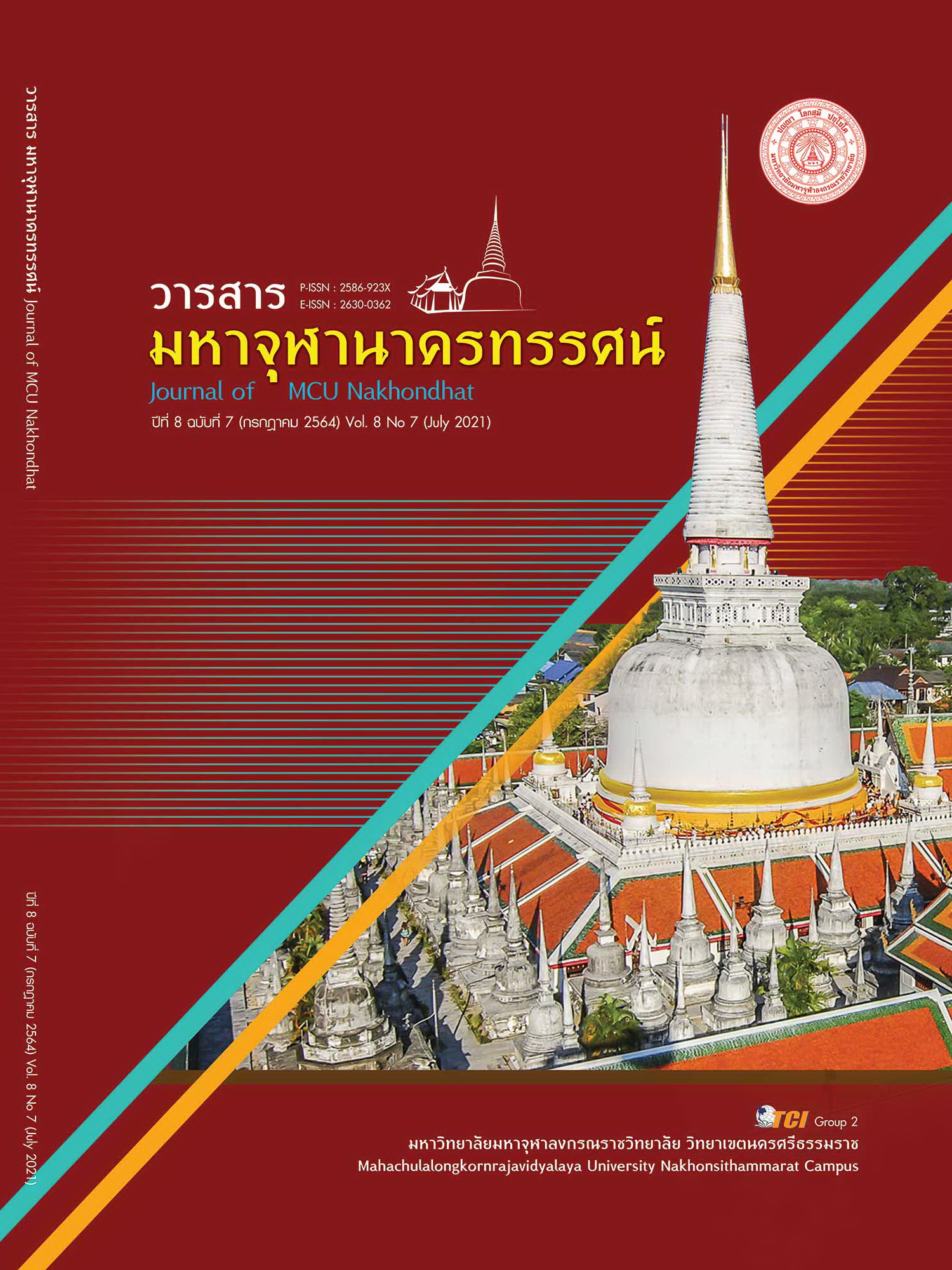THE WORLD OF DHARMA AND THE MAINTENANCE OF PERSONNEL ACCORDING TO BUDDHIST PRINCIPLES
Main Article Content
Abstract
Living of Thai people in every region Is a society that combines indigenous beliefs such as respect for the sacred Respect nature Fit with religious beliefs Thai people have outstanding characteristics Is a generous society Generous Help support Modern lifestyles affect the quality of life in a number of technological and economic factors, enabling people to modify their lifestyles. Buddhism has principles and explanations for common mundane problems. Buddhist principles therefore taught that human beings must accept the condition and events that arise from the world of the virtues and themselves to the eight worlds of this one will cause a desire. Efforts to make it happen without limits. And when he got it, he was often fascinated Forgetting yourself, causing negligence in things the moral aspect, on the contrary, is something that no one wishes to happen to him. Retention of personnel is an important process. Make the organization have good personnel, have the ability and expertise, reduce the rate of attendance and work. And initiate and create new works as a result, the work can proceed continuously. It creates a good image, showing that the organization provides the well-being that is warm and stable. In Buddhism, there is a principle about people to live with society, that is, the Dhamma of the world has lost fortune, has decayed rank, praises gossip, happiness and suffering. It is a principle that administrators and personnel have to emphasize on the maintenance of personnel according to the Buddhist principles.
Article Details
References
ธมฺมวฑฺโฒ ภิกฺขุ. (2545). พุทธวิธีคลายโศก. พิมพ์ครั้งที่ 11. กรุงเทพมหานคร: เซเว่น พริ้นติ้ง กรุ๊ป จำกัด.
ธันย์ชนก ศรีสวัสดิ์. (2556). การศึกษาแนวทางปฏิบัติในการธำรงรักษาบุคลากรที่มีสมรรถนะสูง:กรณีศึกษา สำนักงานคณะกรรมการข้าราชการพลเรือน. ใน วิทยานิพนธ์มหาบัณฑิต สาขารัฐประศาสนศาสตร์. มหาวิทยาลัยมหิดล.
ปฐมพงษ์ โตพานิชสุรีย์. (2553). การรักษาผู้มีผลสัมฤทธิ์สูงในองค์การ กรณีศึกษาข้าราชการพลเรือนสามัญ. วารสารบริหารธุรกิจ, 33 (127). 35-49.
ปราโมทย์ ปาโมชฺโช. (2563). โลกวุ่นวายไปตามธรรมดาของโลก. เรียกใช้เมื่อ 6 มกราคม 2564 จาก https://www.podbean.com/podcast-detail/yzahw-3fdc4/A1-Podcast
พระไตรปิฎกฉบับสยามรัฐ. (2564). โลกธรรม 8. เรียกใช้เมื่อ 6 มกราคม 2564 จาก https://th.wikipedia.org.
พระไตรปิฎกฉบับสยามรัฐ. (2564). โลกวิปัตติสูตร. เรียกใช้เมื่อ 5 มกราคม 2564 จาก https://th.wikipedia.org/wiki/โลกธรรม 8
พระธรรมกิตติวงศ์ (ทองดี สุรเตโช. (2548). คำวัด. กรุงเทพมหานคร: สำนักพิมพ์เลี่ยงเชียง.
พระพรหมคุณาภรณ์ (ป.อ. ปยุตฺโต). (2546). พจนานุกรมพุทธศาสตร์ ฉบับประมวลธรรม. เรียกใช้เมื่อ 6 มกราคม 2564 จาก https://84000.org/tipitaka/dic/d_item. php?i=296
พระพรหมคุณาภรณ์ (ป.อ. ปยุตฺโต). (2552). จะพัฒนาคนกันได้อย่างไร. พิมพ์ครั้งที่ 9. กรุงเทพมหานคร: ผลิธัมม์.
พระพรหมคุณาภรณ์ (ป.อ. ปยุตฺโต). (2552). พุทธธรรม (ฉบับปรับปรุงและขยายความ). พิมพ์ครั้งที่ 11. กรุงเทพมหานคร: โรงพิมพ์มหาจุฬาลงกรณราชวิทยาลัย.
มหาจุฬาลงกรณราชวิทยาลัย. (2539). พระไตรปิฎกภาษาไทย 45 เล่ม. ฉบับมหาจุฬาลงกรณราชวิทยาลัย. กรุงเทพมหานคร: โรงพิมพ์มหาจุฬาลงกรณราชวิทยาลัย.
สุชีวา ลี้วิทยา. (2554). ปัจจัยที่มีผลต่อการธำรงรักษาบุคลากร: ศึกษาเฉพาะกรณีการไฟฟ้าส่วนภูมิภาค. ใน วิทยานิพนธ์บริหารธุรกิจมหาบัณฑิต สาขาวิชาการจัดการทั่วไป. มหาวิทยาลัยรามคำแหง.
ใหม่ เฉตรไธสง. (2559). พระพุทธศาสนา. นครสวรรค์: ภาควิชาปรัชญาและศาสนา.
Khanachanhaengrongpimliangchiang. (2007). Buddhist Proverb Volume 1 Standard Edition. Bangkok: Liangchiang Printing house.


